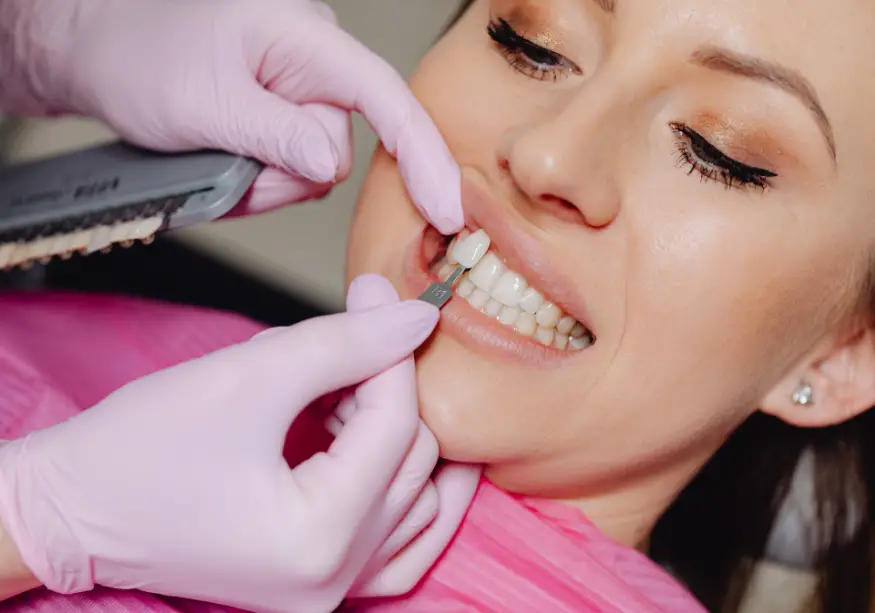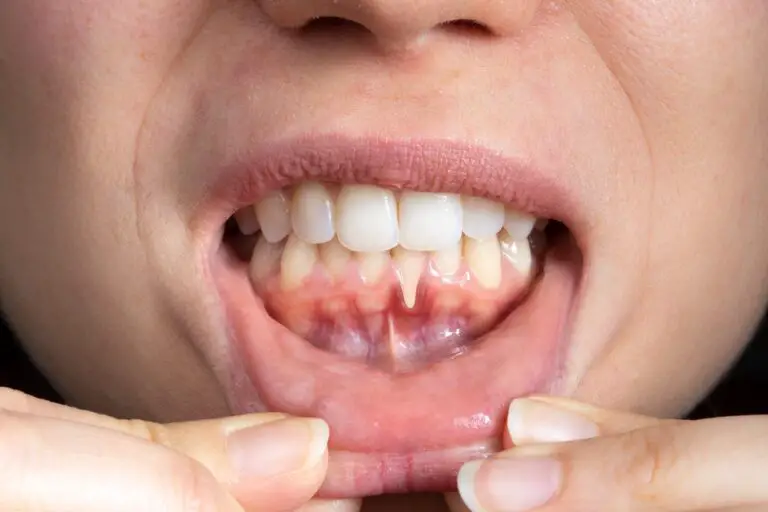Are you considering getting veneers but wondering if it’s possible to go back to your natural teeth if you change your mind? The short answer is no, once you have veneers, you cannot go back to your natural teeth. Veneers are a permanent dental solution that requires the removal of a small amount of enamel from your teeth to make room for the veneers.
It’s important to understand that getting veneers is a commitment to a long-term dental solution. While they can be removed, doing so would require replacing them with new veneers or another dental solution. Additionally, removing veneers can cause damage to your natural teeth and may not result in the same appearance as before the veneers were placed. It’s essential to discuss the potential risks and benefits of veneers with your dentist before making a decision.
Understanding Dental Veneers
If you’re considering dental veneers, it’s important to understand what they are and how they work. Veneers are thin, custom-made shells that are placed over the front surface of your teeth to improve their appearance. They can be made from either porcelain or composite resin, and they’re designed to mimic the look and feel of natural teeth.
One of the main benefits of dental veneers is that they can be used to address a variety of cosmetic issues, including:
- Discolored teeth
- Chipped or broken teeth
- Misaligned or uneven teeth
- Gaps between teeth
To get veneers, your dentist will first need to prepare your teeth by removing a small amount of enamel. This is necessary to ensure that the veneers fit properly and look natural. Once your teeth have been prepared, your dentist will take impressions of your teeth and send them to a dental laboratory, where your veneers will be custom-made.
When your veneers are ready, your dentist will place them on your teeth using a special adhesive. They’ll then use a curing light to harden the adhesive and bond the veneers to your teeth. Once the veneers are in place, you’ll be able to enjoy a brighter, more beautiful smile.
It’s important to note that dental veneers are a permanent solution, as a small amount of enamel is removed during the preparation process. While it’s technically possible to remove veneers and return to your natural teeth, it’s not recommended as it can cause damage to your teeth and compromise their structural integrity.
The Process of Getting Veneers

If you’re considering veneers, it’s important to know what to expect during the process. Here’s an overview of the steps involved:
- Consultation: At your initial consultation, your dentist will examine your teeth and discuss whether veneers are a good option for you. They may also take X-rays and impressions of your teeth to create a model of your mouth.
- Preparation: Before the veneers can be placed, your dentist will need to prepare your teeth by removing a small amount of enamel from the surface. This is done to ensure a proper fit and to create a surface that the veneers can adhere to. Your dentist will then take another impression of your teeth to create a model for the lab that will create your veneers.
- Temporary Veneers: While your permanent veneers are being created, your dentist will place temporary veneers on your teeth to protect them. These may be made of resin or acrylic and will be removed once your permanent veneers are ready.
- Placement: Once your permanent veneers are ready, your dentist will check the fit and color before placing them on your teeth. They will use a special adhesive to bond the veneers to your teeth, and then use a special light to harden the adhesive. After the veneers are in place, your dentist will make any necessary adjustments to ensure a proper fit.
- Aftercare: After getting veneers, it’s important to take good care of them to ensure their longevity. This includes brushing and flossing regularly, avoiding hard or sticky foods, and visiting your dentist for regular checkups and cleanings.
Overall, the process of getting veneers can take several weeks, but the end result is a beautiful, natural-looking smile that can last for many years.
Can You Go Back to Natural Teeth After Veneers?
If you’ve been considering getting veneers to improve your smile, you may be wondering if there’s a way to go back to your natural teeth after you get them. The answer is yes, but it comes with some considerations and potential risks.
Veneers are a thin layer of porcelain or composite material that is placed over your natural teeth to improve their appearance. While they can be a great solution for a variety of dental issues, they are not a permanent fix. Over time, veneers can become damaged or discolored, and they may need to be replaced.
If you decide that you want to go back to your natural teeth after getting veneers, it is possible, but it may not be easy. Here are some things to consider:
- Removing veneers can be a difficult and time-consuming process. It may require the use of a dental drill to remove the veneers, which can be uncomfortable or even painful.
- Once the veneers are removed, your natural teeth may be damaged or weakened. This can make it difficult to chew or even speak properly.
- If you have had your veneers for a long time, your natural teeth may have shifted or moved, which can make it difficult to get them back to their original position.
- If you have had extensive dental work done to prepare your teeth for veneers, such as filing or reshaping, it may not be possible to go back to your natural teeth without further dental work.
Overall, while it is possible to go back to your natural teeth after getting veneers, it may not be the best option for everyone. It’s important to talk to your dentist about your concerns and to weigh the pros and cons carefully before making a decision.
Factors to Consider Before Getting Veneers

If you’re considering getting veneers, there are a few factors you should consider before making your decision. Veneers can be a great option for improving the appearance of your teeth, but they also come with their own set of considerations.
Cost
One of the first things to consider when deciding whether or not to get veneers is the cost. Veneers can be expensive, and the cost can vary depending on a number of factors, including the material used, the number of teeth being treated, and the experience of the dentist performing the procedure.
Porcelain veneers are typically more expensive than composite veneers, but they also tend to last longer. Composite veneers may be a more affordable option, but they may need to be replaced more often.
It’s important to keep in mind that while veneers can be expensive, they can also be a worthwhile investment in your smile and your confidence.
Maintenance
Another factor to consider is the maintenance required for veneers. While veneers are designed to be durable and long-lasting, they still require regular maintenance to keep them looking their best.
You’ll need to brush and floss your teeth regularly to prevent decay and maintain good oral hygiene. You may also need to avoid certain foods and beverages that could stain your veneers or cause damage.
Regular dental check-ups are also important to ensure that your veneers are in good condition and to catch any issues early on.
Longevity
Finally, it’s important to consider the longevity of veneers. While veneers can last for many years with proper care, they are not a permanent solution.
Eventually, your veneers may need to be replaced or repaired. This can be costly and time-consuming, so it’s important to be prepared for this possibility.
Overall, veneers can be a great option for improving the appearance of your teeth, but it’s important to consider all of the factors before making your decision. Talk to your dentist to determine whether veneers are the right choice for you.
Alternatives to Veneers
If you’re not a good candidate for veneers or simply prefer not to get them, there are other options available to improve the appearance of your teeth. Here are a couple of alternatives to consider:
Teeth Whitening
Teeth whitening is a popular and affordable option to brighten your smile. It can be done at home with over-the-counter products or professionally at a dental office. Professional teeth whitening treatments are more effective and can provide faster results. They involve applying a whitening gel to your teeth and using a special light to activate the gel. The treatment usually takes about an hour, and you may need multiple sessions depending on the severity of the stains.
Orthodontic Treatment
If your main concern is crooked or misaligned teeth, orthodontic treatment may be a good option for you. Braces or clear aligners can straighten your teeth and improve your bite. Traditional braces use metal brackets and wires to gradually move your teeth into the desired position. Clear aligners, on the other hand, are custom-made plastic trays that fit over your teeth and gently shift them over time. They are virtually invisible and can be removed for eating and cleaning.
Keep in mind that orthodontic treatment can take longer than veneers or teeth whitening, and it may not be suitable for everyone. Your dentist or orthodontist can help you determine if it’s the right choice for you.
Overall, there are several alternatives to veneers that can help you achieve the smile you want. Talk to your dentist about your options and which one is best for you.
The Impact of Veneers on Natural Teeth
If you’re considering getting veneers, it’s important to understand the impact they can have on your natural teeth. While veneers can improve the appearance of your smile, they do require some preparation and alteration to your natural teeth.
First, your dentist will need to remove a small amount of enamel from the surface of your teeth to make room for the veneers. This process is irreversible, meaning that you won’t be able to go back to your natural teeth once the enamel is removed.
Additionally, if the veneers are not installed properly or if you neglect your dental hygiene, decay can still occur on the underlying natural teeth. This is why it’s important to maintain good oral hygiene habits and visit your dentist regularly for check-ups.
It’s also worth noting that veneers can be more prone to chipping and cracking than other dental restorations like crowns or fillings. While they are durable and long-lasting, they do require some extra care to ensure they remain intact.
Overall, while veneers can have a positive impact on your smile, it’s important to carefully consider the impact they will have on your natural teeth before making a decision. Talk to your dentist about your options and any concerns you may have.
The Importance of Dental Consultation Before Getting Veneers
Before getting dental veneers, it is important to have a consultation with a cosmetic dentist to determine if veneers are the best option for you. Veneers are a cosmetic dental procedure that can address a range of issues, such as gaps, chips, cracks, stains, unevenness, discoloration, and misalignment. However, not everyone is a good candidate for veneers.
During the consultation, the dentist will examine your teeth and discuss your goals and concerns. They will also explain the veneers procedure, the benefits and risks, and the cost. You should ask any questions you have and make sure you understand everything before making a decision.
One important factor to consider is the condition of your teeth and gums. If you have gum disease or tooth decay, you will need to have these issues treated before getting veneers. Veneers are not a solution for dental problems, and they can actually make them worse if not properly addressed.
Another consideration is the type of veneers that will work best for you. There are two main types of veneers: porcelain and composite. Porcelain veneers are more durable and natural-looking, but they are also more expensive. Composite veneers are less expensive but not as durable or long-lasting.
Your dentist will help you decide which type of veneers is best for your needs and budget. They may also recommend alternative treatments, such as teeth whitening or orthodontics, depending on your specific situation.
In summary, a consultation with a cosmetic dentist is crucial before getting veneers. This will ensure that you are a good candidate for the procedure, that your dental issues are properly addressed, and that you make an informed decision about your dental health.
Frequently Asked Questions
How long do veneers typically last?
Porcelain veneers typically last between 10 to 15 years, while composite veneers last around 5 to 7 years. However, with proper care and maintenance, veneers can last even longer.
What are composite veneers and how do they differ from traditional veneers?
Composite veneers are made of a tooth-colored resin material that is applied directly to the tooth. They are typically less expensive than porcelain veneers and can be completed in a single visit. However, they are not as durable as porcelain veneers and may need to be replaced more frequently.
Is it possible to reverse the process of getting veneers and return to natural teeth?
Unfortunately, once you have veneers, it is not possible to simply remove them and return to your natural teeth. The process of getting veneers involves removing a small amount of tooth enamel, and this cannot be undone. However, if you are unhappy with your veneers, there are other options available.
What happens to the original teeth after getting veneers?
The original teeth are typically trimmed down and reshaped to make room for the veneers. In some cases, the teeth may need to be filed down quite a bit. However, this process is generally painless and does not require any anesthesia.
What options are available if I am unhappy with my veneers?
If you are unhappy with your veneers, you should discuss your concerns with your dentist. Depending on the issue, it may be possible to make adjustments to the veneers or replace them entirely. In some cases, orthodontic treatment may be recommended to correct any underlying issues with your teeth.
Can veneers be removed if I decide I don’t want them anymore?
Yes, veneers can be removed, but the process can be quite challenging and may require the use of a dental drill. Additionally, once the veneers are removed, your natural teeth may be more sensitive and prone to decay. It is important to discuss the risks and benefits of veneer removal with your dentist before making any decisions.







